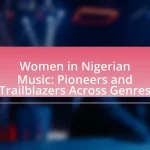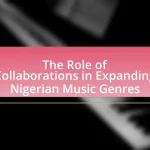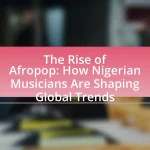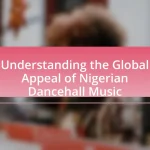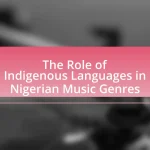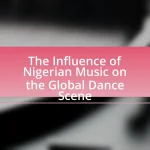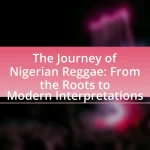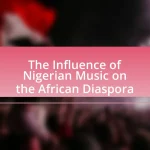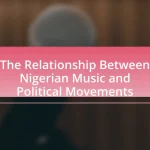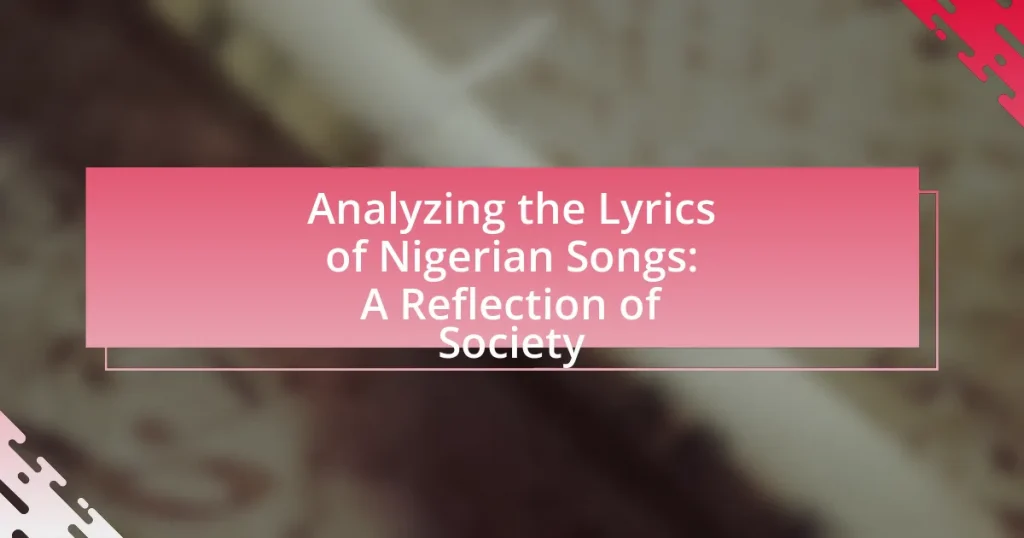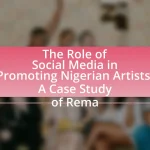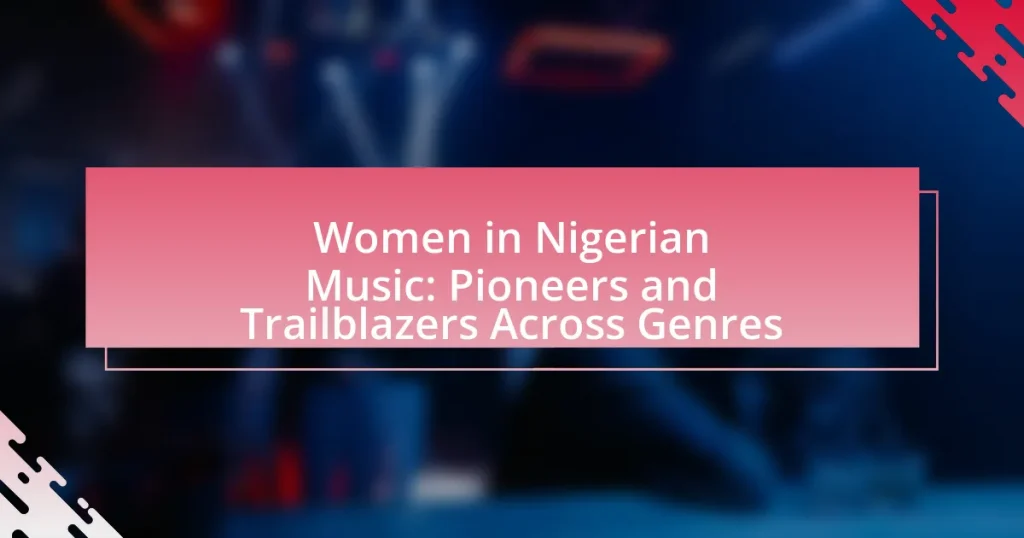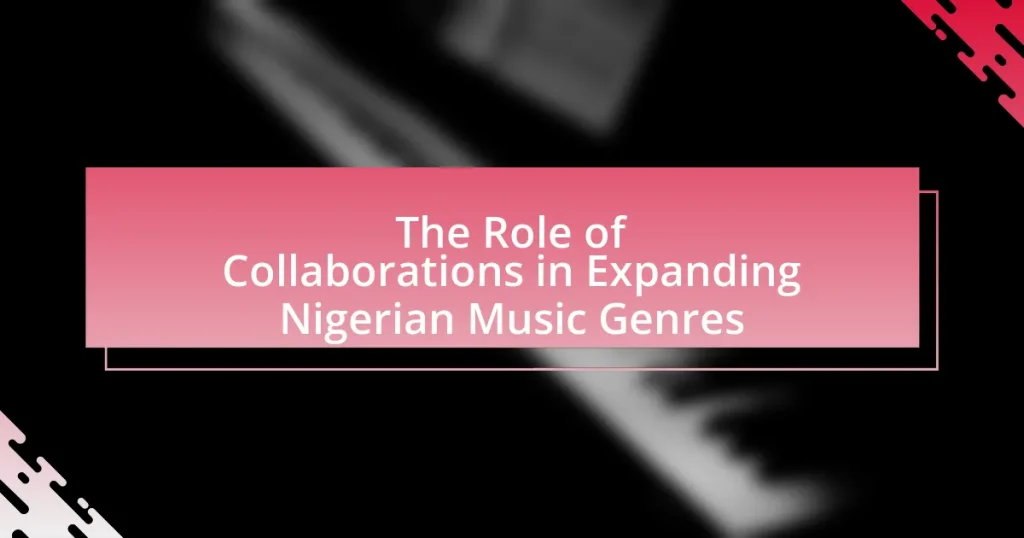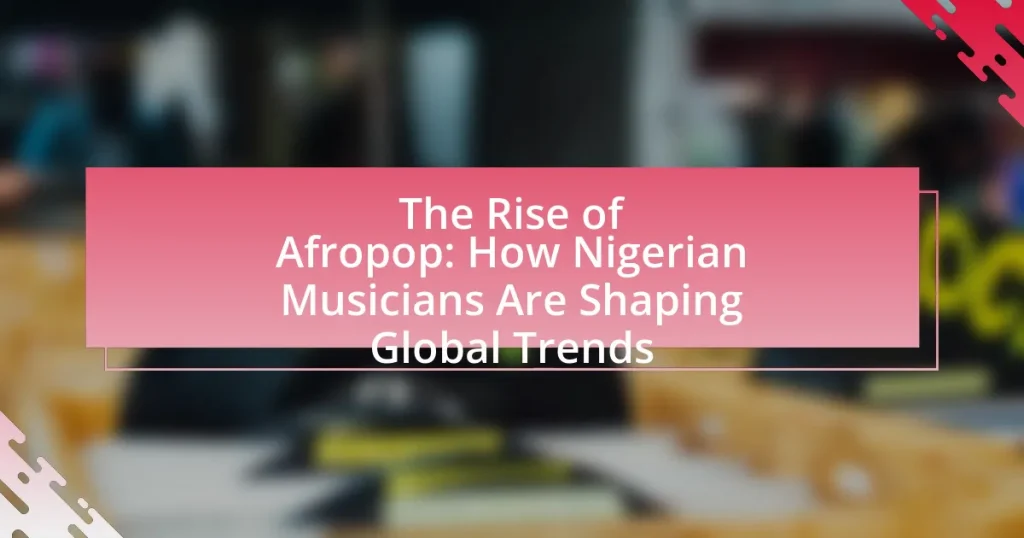The article focuses on the significance of analyzing the lyrics of Nigerian songs as a reflection of societal dynamics. It explores how these lyrics provide insights into cultural values, social issues, and political commentary, highlighting themes such as love, corruption, and community. The discussion includes the influence of various music genres on lyrical content, the role of traditional music in contemporary lyrics, and methods for effective lyrical analysis. Additionally, it emphasizes the importance of audience interpretation and engagement in fostering social awareness through music.
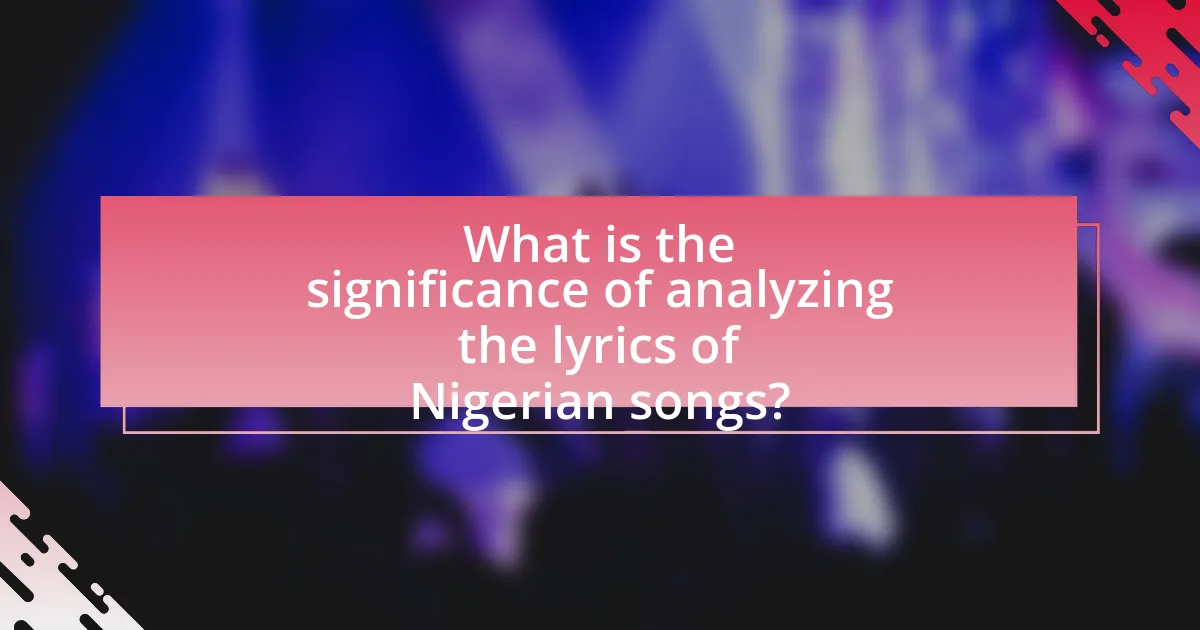
What is the significance of analyzing the lyrics of Nigerian songs?
Analyzing the lyrics of Nigerian songs is significant because it provides insight into the cultural, social, and political dynamics of Nigerian society. The lyrics often reflect the experiences, struggles, and aspirations of the people, serving as a medium for storytelling and social commentary. For instance, songs by artists like Fela Kuti address issues such as corruption and social injustice, highlighting the role of music as a form of protest and a catalyst for change. This analysis can reveal underlying themes of identity, resilience, and community, making it a valuable tool for understanding the complexities of Nigerian life and the broader African context.
How do Nigerian song lyrics reflect cultural values?
Nigerian song lyrics reflect cultural values by incorporating themes of community, tradition, and social issues. These lyrics often celebrate communal ties, emphasizing the importance of family and relationships, which are central to Nigerian culture. For instance, songs by artists like Fela Kuti address political and social injustices, highlighting the collective struggles of the people. Additionally, genres such as Highlife and Afrobeats frequently reference traditional practices, folklore, and proverbs, reinforcing cultural identity and heritage. This connection to cultural values is evident in the way artists use local languages and dialects, making their messages resonate deeply with their audiences.
What themes are commonly found in Nigerian song lyrics?
Common themes found in Nigerian song lyrics include love, social issues, cultural identity, and celebration of life. Love is often expressed through romantic ballads and relationships, reflecting deep emotional connections. Social issues such as poverty, corruption, and political struggles are frequently addressed, highlighting the challenges faced by the populace. Cultural identity is celebrated through the incorporation of indigenous languages, traditional rhythms, and references to Nigerian heritage. Additionally, songs often celebrate life events, such as weddings and festivals, showcasing joy and communal spirit. These themes resonate with listeners and reflect the diverse experiences of Nigerian society.
How do these themes relate to Nigerian societal issues?
Themes in Nigerian songs often reflect societal issues such as corruption, poverty, and social injustice. For instance, many artists address the pervasive corruption in government, highlighting how it affects everyday life and economic stability. A notable example is Fela Kuti, whose music criticized political leaders and called for social change, resonating with the widespread frustration among citizens. Additionally, themes of poverty are prevalent, as seen in songs that depict the struggles of the average Nigerian, emphasizing the gap between the wealthy elite and the impoverished majority. This connection between music and societal issues illustrates how artists use their platforms to raise awareness and inspire change, making the themes in their lyrics a mirror of the challenges faced by Nigerian society.
In what ways do lyrics serve as a social commentary?
Lyrics serve as a social commentary by reflecting societal issues, cultural norms, and political sentiments. For instance, Nigerian songs often address themes such as corruption, poverty, and social injustice, providing a voice to the marginalized and fostering awareness among listeners. A notable example is Fela Kuti’s music, which critiques government corruption and human rights abuses in Nigeria, influencing public opinion and inspiring activism. This use of lyrics as a medium for social commentary not only highlights pressing issues but also encourages dialogue and change within society.
What historical events are often referenced in Nigerian songs?
Nigerian songs often reference significant historical events such as the Nigerian Civil War, the fight for independence from British colonial rule, and the military coups that have shaped the nation’s political landscape. The Nigerian Civil War, which lasted from 1967 to 1970, is frequently depicted in songs that address themes of loss, resilience, and unity. Songs like “Zombie” by Fela Kuti critique military rule and the societal impact of coups, while other artists reflect on the struggles for democracy and social justice. These references serve to connect contemporary issues with historical contexts, illustrating the ongoing influence of these events on Nigerian identity and culture.
How do artists use lyrics to address political issues?
Artists use lyrics to address political issues by incorporating social commentary, personal experiences, and historical context into their songs. For instance, Nigerian artists like Fela Kuti and Burna Boy have utilized their music to critique government corruption, social injustice, and human rights violations. Fela Kuti’s song “Zombie” directly criticized the Nigerian military’s brutality, while Burna Boy’s “Anybody” addresses systemic oppression and the need for change. These lyrics resonate with listeners, raising awareness and prompting discussions about political realities. The effectiveness of this approach is evident in the way these songs have mobilized public sentiment and inspired movements for social change in Nigeria.
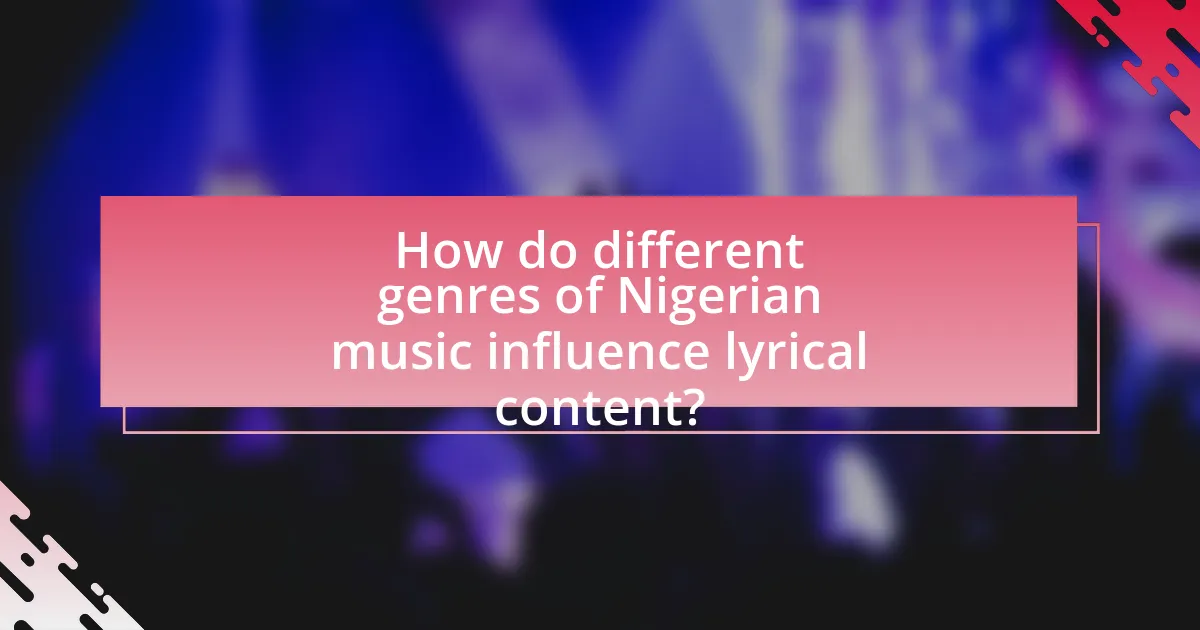
How do different genres of Nigerian music influence lyrical content?
Different genres of Nigerian music significantly influence lyrical content by shaping themes, language, and cultural references. For instance, Afrobeat often incorporates political and social commentary, reflecting Nigeria’s socio-political landscape, as seen in the works of Fela Kuti, who addressed corruption and governance issues. In contrast, Highlife tends to focus on romance and celebration, using vernacular languages and idiomatic expressions that resonate with local audiences. Additionally, Hip Hop in Nigeria frequently addresses personal struggles, aspirations, and societal challenges, mirroring global trends while infusing local dialects and slang. This genre diversity allows for a rich tapestry of lyrical narratives that reflect the complexities of Nigerian society, as evidenced by the varied themes present in the music of artists like Wizkid, Olamide, and Tiwa Savage.
What are the key genres of Nigerian music?
The key genres of Nigerian music include Afrobeats, Highlife, Juju, Fuji, and Gospel music. Afrobeats, characterized by its fusion of various musical styles, has gained international popularity, with artists like Burna Boy and Wizkid leading the charge. Highlife, originating from the Igbo and Akan cultures, blends traditional melodies with Western instruments. Juju music, rooted in Yoruba traditions, incorporates talking drums and is often associated with social commentary. Fuji music, also from the Yoruba culture, is a genre that evolved from traditional Islamic music and is known for its energetic rhythms. Gospel music in Nigeria reflects the country’s strong Christian faith, featuring both contemporary and traditional styles. Each genre plays a significant role in expressing the diverse cultural and social narratives of Nigerian society.
How does Afrobeats differ in lyrical themes from Highlife?
Afrobeats differs from Highlife in lyrical themes primarily by focusing on contemporary issues, romance, and nightlife, while Highlife often emphasizes cultural heritage, social commentary, and traditional values. Afrobeats lyrics frequently explore themes of love, partying, and personal experiences, reflecting modern urban life and global influences. In contrast, Highlife lyrics tend to celebrate African traditions, community, and social issues, often incorporating storytelling elements that highlight historical and cultural contexts. This distinction is evident in the evolution of both genres, where Afrobeats has emerged as a global phenomenon, appealing to younger audiences, while Highlife remains rooted in its historical and cultural significance.
What role does traditional music play in contemporary lyrics?
Traditional music significantly influences contemporary lyrics by providing cultural context, thematic depth, and emotional resonance. In Nigerian songs, traditional music elements such as indigenous rhythms, instruments, and storytelling techniques are often integrated into modern compositions, creating a bridge between past and present. For instance, artists like Burna Boy and Wizkid incorporate traditional Yoruba and Igbo musical styles into their lyrics, reflecting societal issues and cultural heritage. This fusion not only preserves traditional music but also enhances the relatability and authenticity of contemporary lyrics, allowing them to resonate with a broader audience while maintaining a connection to cultural roots.
How do collaborations between genres affect lyrical expression?
Collaborations between genres significantly enhance lyrical expression by blending diverse musical styles and cultural narratives. This fusion allows artists to explore new themes and perspectives, enriching the lyrical content. For instance, the collaboration between Afrobeat and hip-hop has led to the emergence of songs that address social issues, personal experiences, and cultural identity in innovative ways. A notable example is the partnership between Nigerian artist Burna Boy and American rapper J. Cole, which resulted in lyrics that reflect both African heritage and global experiences, showcasing how genre blending can create a more nuanced lyrical landscape.
What examples illustrate genre blending in Nigerian music?
Genre blending in Nigerian music is exemplified by the fusion of Afrobeat and hip-hop, as seen in the works of artists like Wizkid and Olamide. Wizkid’s collaboration with Drake on “One Dance” showcases a mix of Afrobeat rhythms with contemporary R&B and hip-hop elements, reflecting a global appeal. Similarly, Olamide’s “Wo” incorporates traditional Yoruba sounds with modern trap beats, illustrating the integration of indigenous music with contemporary genres. These examples highlight how Nigerian artists creatively merge different musical styles to resonate with diverse audiences while maintaining cultural authenticity.
How do artists from different genres influence each other’s lyrics?
Artists from different genres influence each other’s lyrics through cross-genre collaborations and the blending of musical styles. For instance, hip-hop artists often incorporate elements of Afrobeat, leading to lyrics that reflect cultural narratives and social issues prevalent in both genres. A notable example is the collaboration between Wizkid, a prominent Afrobeat artist, and Drake, a hip-hop artist, which resulted in lyrics that merge themes of love and celebration with urban experiences. This exchange fosters a rich dialogue between genres, allowing artists to draw inspiration from each other’s storytelling techniques and cultural contexts, ultimately enriching the lyrical landscape.
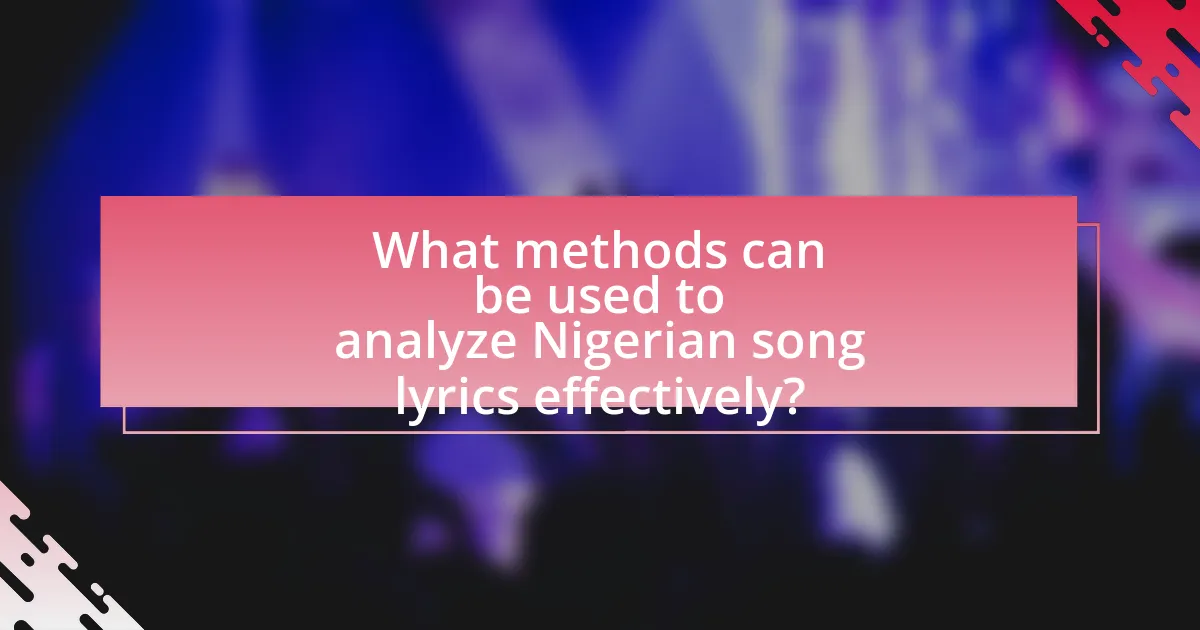
What methods can be used to analyze Nigerian song lyrics effectively?
To analyze Nigerian song lyrics effectively, one can employ methods such as thematic analysis, linguistic analysis, and cultural contextualization. Thematic analysis involves identifying and interpreting recurring themes within the lyrics, which can reveal societal issues, cultural values, and emotional expressions prevalent in Nigerian society. Linguistic analysis focuses on the language, style, and rhetorical devices used in the lyrics, providing insights into the artistic choices and communication strategies of the artists. Cultural contextualization examines the historical, social, and political background influencing the lyrics, allowing for a deeper understanding of the messages conveyed. These methods collectively enhance the comprehension of how Nigerian songs reflect societal dynamics and cultural narratives.
What analytical frameworks are applicable to song lyrics?
Several analytical frameworks applicable to song lyrics include structuralism, semiotics, and thematic analysis. Structuralism focuses on the underlying structures of language and meaning within the lyrics, allowing for an examination of how different elements interact to create overall significance. Semiotics analyzes signs and symbols in the lyrics, exploring how they convey cultural and social meanings. Thematic analysis identifies recurring themes and motifs, providing insight into societal reflections and cultural narratives present in the lyrics. These frameworks enable a comprehensive understanding of the complexities and implications of song lyrics, particularly in the context of Nigerian songs that often reflect societal issues and cultural identity.
How can literary devices enhance the understanding of lyrics?
Literary devices enhance the understanding of lyrics by providing deeper layers of meaning and emotional resonance. For instance, metaphors can create vivid imagery that connects listeners to the themes of the song, while similes can draw comparisons that clarify complex emotions. Additionally, alliteration and rhyme contribute to the musicality of lyrics, making them more memorable and engaging. Research indicates that songs employing literary devices often resonate more with audiences, as they evoke feelings and thoughts that align with personal experiences, thereby fostering a stronger connection to the societal issues reflected in the lyrics.
What role does audience interpretation play in lyric analysis?
Audience interpretation is crucial in lyric analysis as it shapes the meaning and emotional impact of the lyrics. The subjective nature of interpretation allows listeners to connect personal experiences and cultural contexts to the song, leading to diverse understandings. For instance, a lyric that addresses social issues may resonate differently with individuals based on their backgrounds, thus enriching the analysis with multiple perspectives. This variability in interpretation highlights the dynamic relationship between the artist’s intent and the audience’s reception, emphasizing that meaning is co-created through interaction.
How can one apply lyrical analysis to understand societal issues?
One can apply lyrical analysis to understand societal issues by examining the themes, language, and cultural references present in the lyrics. This method reveals insights into the social, political, and economic contexts that influence the artists and their communities. For instance, Nigerian songs often address topics such as corruption, inequality, and cultural identity, reflecting the lived experiences of the populace. Analyzing lyrics from artists like Fela Kuti, who critiqued government corruption and social injustice, provides concrete examples of how music serves as a commentary on societal challenges. Such analysis not only highlights the artists’ perspectives but also fosters a deeper understanding of the collective consciousness and struggles within society.
What practical steps can be taken to analyze a song’s lyrics?
To analyze a song’s lyrics, one should first read the lyrics thoroughly to understand the overall message and themes. Next, identify literary devices such as metaphors, similes, and imagery that contribute to the song’s meaning. Then, consider the context in which the song was written, including the cultural, social, and historical background relevant to the artist and the audience. Additionally, examine the emotional tone and mood conveyed through word choice and phrasing. Finally, compare the lyrics to other works by the same artist or within the same genre to identify patterns or recurring themes. This methodical approach allows for a comprehensive understanding of the song’s significance and its reflection of societal issues.
How can listeners engage with lyrics to foster social awareness?
Listeners can engage with lyrics to foster social awareness by actively analyzing the themes and messages conveyed in the songs. This engagement involves critical listening, where individuals reflect on the societal issues presented in the lyrics, such as poverty, corruption, and inequality, which are prevalent in many Nigerian songs. For instance, songs by artists like Fela Kuti often address political corruption and social injustice, prompting listeners to consider the implications of these issues in their own lives and communities. By discussing these themes in social settings or online platforms, listeners can raise awareness and inspire collective action, thereby transforming personal insights into broader social movements.
